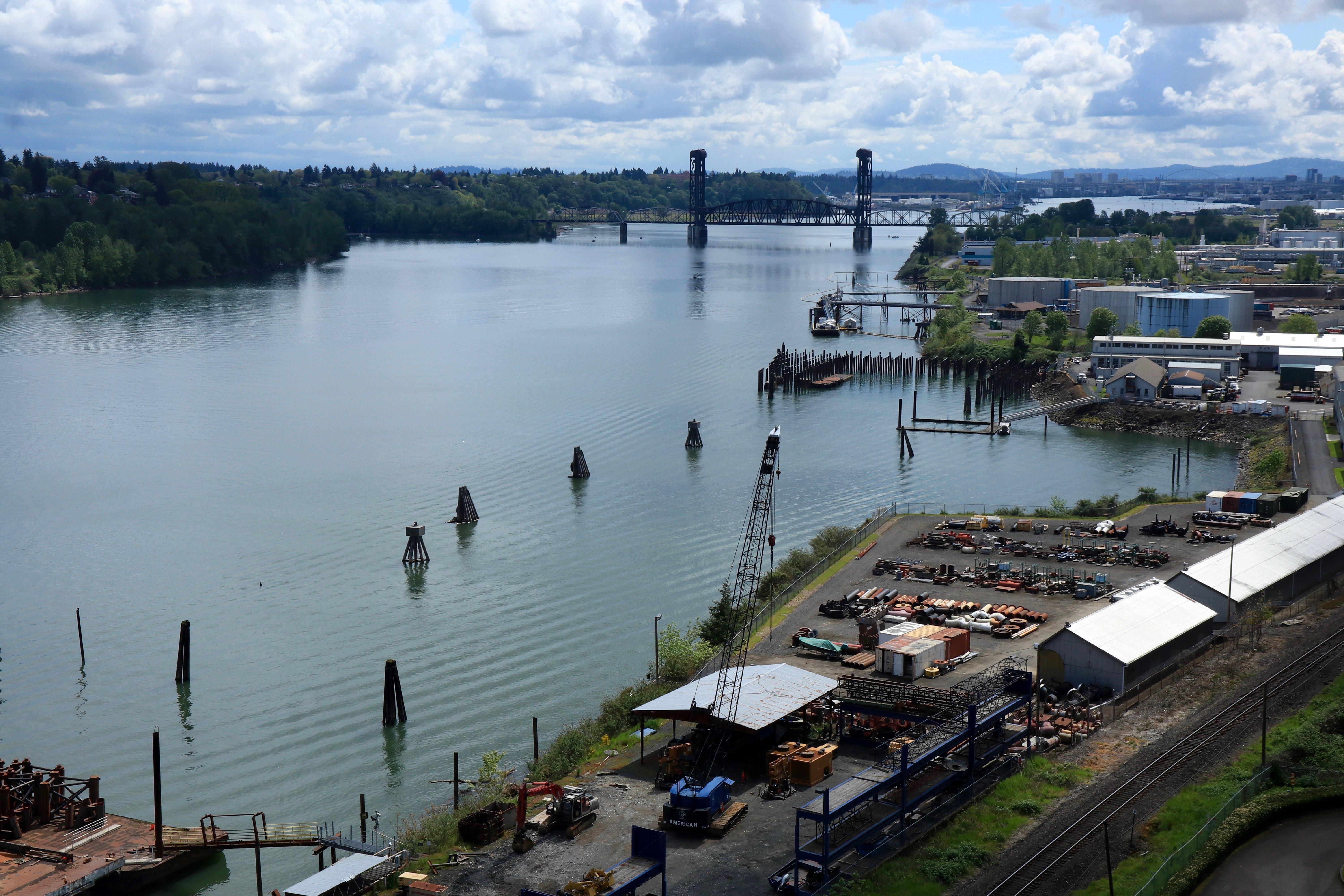
More than a hundred parties share responsibility for cleaning up the highly polluted 10-mile stretch of the Willamette River known as the Portland Harbor Superfund Site.
Cassandra Profita/OPB / EarthFix
As the U.S. Environmental Protection Agency was announcing eight major cleanup agreements for the Portland Harbor Superfund Site this week, four companies were filing a petition challenging the agency's core cleanup plan.
In their petition, which was obtained by OPB, Evraz Inc., Gunderson LLC, Schnitzer Steel Industries and Vigor Industrial argue the EPA needs to update its cleanup requirements for the Portland Harbor site before they will agree to doing their part of the cleanup.
The EPA has already rejected a similar request from the companies to scale back its targets for how clean the river needs to be, and critics say the petition is just one of many examples of these companies trying to delay a cleanup process that has already stretched on far too long.
The four companies say new data show the site is much less contaminated than older test results showed and that the new data should be used to scale back the scope and overall cost of the cleanup. OPB has reached out to the four companies and the EPA. None had immediately responded.
The Portland Harbor Superfund Site covers nearly 11 miles of the Willamette River from the Broadway Bridge to the Columbia Slough. The area is highly contaminated with dozens of pollutants from more than a century of industrial use. The EPA has spent about 20 years working toward a Superfund cleanup involving more than a hundred parties that share responsibility for the contamination.
The agency’s cleanup plans for the site were finalized in its 2017 record of decision. The next stage of the process involves individual parties designing their own cleanup plans for their portions of the site.
Many of the parties have now signed agreements with the EPA to start planning their own cleanups, which will likely involve dredging and removing the most contaminated soil from the bottom of the river and covering less contaminated areas with clean soil.
Related: New Portland Harbor Superfund Cleanup Agreements Secured By EPA
But the four companies petitioning the EPA are holding out because they say they don’t want to design their cleanup plans around old data in the 2017 record of decision.
"The remedy selected in 2017 was based on very old data, most of which was collected in 2004," they stated in a March 9 letter to EPA Administrator Andrew Wheeler that accompanied their petition.
If that old data is used in the next phase of the cleanup, they wrote, “the designs will be based on outdated site data at great cost to the community and taxpayers.”
Schnitzer Steel and Evraz were among the companies that volunteered to do additional sampling in the river in 2018 to provide new data on contamination at the site. They concluded that the river is much cleaner now than it was when the earlier pollution testing was done, likely because of early cleanup work, natural recovery and efforts to control new sources of pollution entering the river.
Their data shows contaminant concentrations in fish across the site are down 65% since the 2004 sampling and levels of toxic PCBs, or polychlorinated biphenyls, in sediment are down 52%.
In their petition they're asking the EPA to change its cleanup plan to reflect the new data, which they say would cut the scope of the required cleanup in half and cut down on billions of dollars of unnecessary dredging. They argue it would only take a few months to update the EPA's plan, and if the agency hadn't been resistant to the idea when they first proposed it last year it would be done by now.
“Moreover, any limited delay ... would be minimal compared to the delay in cleanup if the EPA chooses instead to pursue enforcement actions and to defend challenges to the [record of decision],” they wrote.
The letter, signed by attorneys for Schnitzer Steel and Evraz, hints at a legal fight to come, noting that if the EPA fails to update its cleanup plan, "it will be acting in an arbitrary and capricious manner."
In announcing cleanup agreements with other companies and public agencies this week, EPA officials said they plan to issue enforcement orders to parties that aren't negotiating with the agency in good faith.
The EPA did not immediately respond to a request for comment on the petition, but the agency has already denied a similar request from the same companies.
Last year, after submitting their new data to the EPA, Schnitzer Steel and Evraz along with the Marine Group and Arkema Inc., asked the agency to revise its cleanup plan to reflect their findings.
The agency denied that request, with officials saying they would use the data but didn't agree with the conclusions the companies reached about the need to change the record of decision. Officials suggested the companies could incorporate the new data into their designs for cleaning up their portions of the site.
Bob Sallinger, conservation director for Portland Audubon, accused the companies of trying to delay the cleanup process — by as long as 10 years in his estimate.
“It’s outrageous really,” he said. “They’ve left our community at risk literally for decades. It’s time for them to clean up their mess. It’s way past time.”
Sallinger noted that last year the companies met with Wheeler, the EPA administrator, raising questions about whether they’re trying to get the Trump administration to overrule the Northwest regional EPA officials who have been leading the work on the Portland Harbor cleanup plan thus far.
“We want to make sure the EPA doesn’t respond to this petition in a way that slows things down,” Sallinger said. “So far the EPA has taken a hard line and for the most part has been keeping this process on track."
